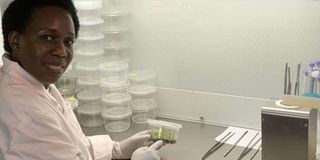Biotechnologist turns passion to profit

Dr Rachel Okeyo, founder of Arbres Biotech, a company that deals in micro-propagation of orchids, banana and coffee seedlings.
What you need to know:
- Dr Okeyo started her tissue culture business in 2018 from a small laboratory set up in Kitengela, Kajiado County, with a capital of Sh400,000.
- Her company, Arbres Biotech, deals in micro-propagation of orchids, banana and coffee seedlings.
- Tissue culture involves collecting fragments of a plant or animal tissue and growing them under controlled nutritional and environmental conditions - micro-propagation.
Dr Rachel Okeyo had something special with orchids; ornamental plants.
Her hobby was micro-propagating them. The plant biotechnologist did not visualise the hobby becoming a business until she started receiving requests from farmers for banana seedlings.
Armed with her 15 years wealth of research and experience in plant tissue culture and genetic manipulation of plants, the 45-year-old Dr Okeyo dived into the business of tissue culture.
This is how Arbres Biotech was born - a company dealing in micro-propagation of orchids, banana and coffee seedlings.
Tissue culture involves collecting fragments of a plant or animal tissue and growing them under controlled nutritional and environmental conditions, a process otherwise called micro-propagation.
Bought machines
She started the business in 2018 from a small laboratory set up in Kitengela, Kajiado County, with a capital of Sh400,000. She bought machines and products needed to micro-propagate including distilled water.
Dr Okeyo has two staff with whom they generate the seedlings for farmers in Western, Central and Nairobi regions.
Interestingly, Dr Okeyo had never imagined handling plants until she got married and started growing a variety of crops. The frustrations of getting high quality seedlings and seeds prompted the interest in plants, which she says “grew gradually.”
Furthermore, she was brought up in Nairobi and Mombasa where there were no farms.
She studied at Kongoni Primary, Nairobi and Mombasa Primary in Mombasa before joining Mama Ngina High School, also in Mombasa. As she went through school, her focus was to study medicine.
Pursue Medicine
She, however, was admitted to Maseno University for a Bachelor of Science course in botany and zoology. Her father, knowing her desire to pursue medicine, visited different universities to get her a placement but the cluster points weren’t adding up.
He encouraged her to go for the botany and zoology and later enrol for medicine should there still be interest
But by the time she was done with her undergraduate studies, her interest in medicine was dead. She majored in botany and zoology as a minor.
Between 2003 and 2004, Dr Okeyo now married, enrolled for a Masters in biological sciences with a bias in plant biotechnology at University of Nottingham in United Kingdom. She finally got her doctoral in plant genetics from University of Nairobi.
As she looks into the future, her five-year plan envisions a national, regional and international clientele base. She also intends to diversify her production to other crop varieties.
Biotechnology lecturer
“Our greatest advantage is that we have experience in tissue culture of a variety of crops so we are able to deliver according to the customer’s needs,” says the plant biotechnologist, a mother of the three.
The University of Nairobi plant biotechnology lecturer is amazed with her achievement as her initial interest was to have a laboratory of her own to facilitate her researches and offer students a facility for learning.
She agrees to be less skilled in management of business. Last year, she underwent, a 12-week business training under Women in Technology Program by Standard Chartered Kenya and Strathmore University's business centre @iBizAfrica, which she says helped her bridge the skills gap. She was also awarded Sh1 million to grow her business, which she intends to use in buying modern machines to boost her production.
“I had no idea about financial models, prototyping or branding. It was a new start to me having a scientific background,” says Dr Okeyo.
A 2016 Micro, Small and Medium Enterprises(MSME) survey by Kenya National Bureau of Statistics(KNBS) showed more than half (54.9 per cent) of the businesses that failed in 2015 were women-owned.
Lack of skilled manpower, inadequate capital and poor infrastructure were cited as the factors leading to the failure of the MSMEs.
At the onset, Dr Okeyo had projected producing 100,000 seedlings in five years only for her to get an order from just one client to supply one million seedlings annually.
It shocked her into rethinking her business model from producing 10,000 seedlings each planting season-March and September -to generating a weekly bulk of 20,000.
“I had extremely underestimated the potential of the business and the market size,” says Dr Okeyo.
In five years, Dr Okeyo hopes to have established a full-fledged large-sized laboratory to produce a variety of the seedlings in bulk within a short period of time.
She urges women to “be on the lookout for opportunities to grow their businesses.”




